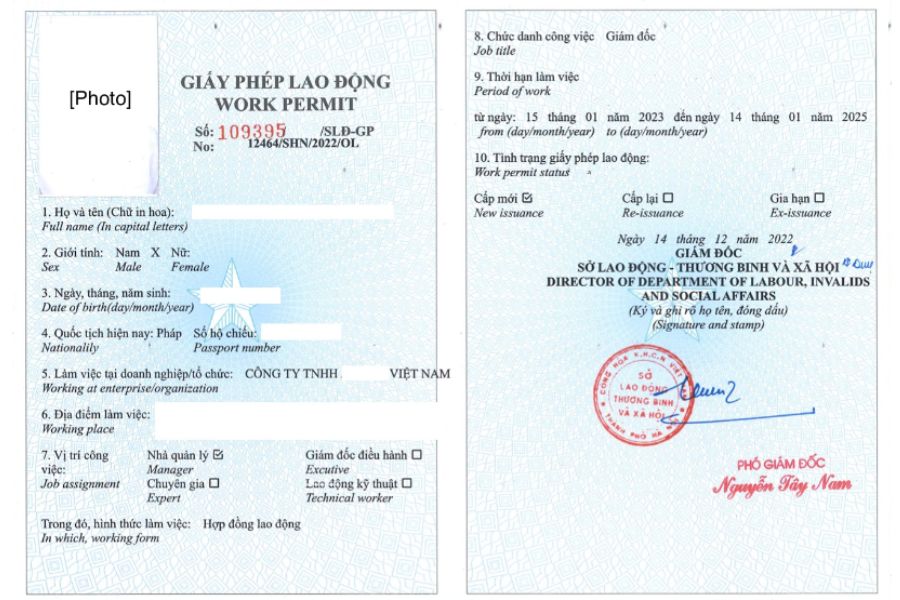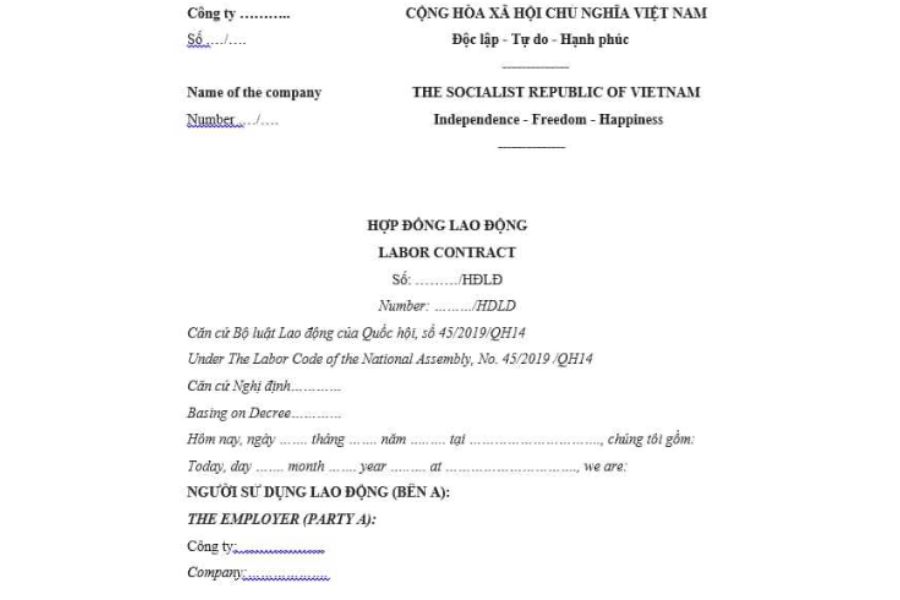Key Takeaways
- The 2019 Labor Code enacted by the National Assembly of Vietnam on November 20, 2019, continues to take effect in 2024, and a new code has yet to be promulgated.
- Starting from July 2024, the base salary and minimum wage have increased. How much? Refer to the provisions of the Vietnam Labor Laws with regard to the fields of wages, work permits, contracts, and others for compliance.
How Do Labor Laws in Vietnam Regulate Work Permits?
A work permit is a required document for foreigners who want to work legally in Vietnam, with some exceptions. Those exempt from this requirement include foreign investors, legal representatives of a company, members of a company’s board of directors, and foreigners married to Vietnamese citizens who reside in Vietnam.

Vietnam work permits are valid for up to two years and can only be extended once, for an extra two years. Source: novalaw.vn
It is necessary for the application to be made according to the following conditions:
- Having 18 years or more and full civil act capacity; Being healthy enough;
- Having a clean record of foreign and Vietnam jurisdictions;
- Having a passport valid for at least six months.
- Having professional qualifications, technical skills, and work experience that is suitable for the job position assigned in Vietnam
- Be hired by an eligible business in Vietnam, one in which the company can sponsor a foreigner for a work permit; for example, it should be registered with a business license, adequately capitalized, have adequate assets, proper labor conditions, and facilities compliant with the labor laws and regulations.
Other requirements include relevant certificates and years of experience, which are required for Experts, Managers, Executive Directors, and Technical Workers. More details can be referred to “Work Permit Vietnam: Types & How to Obtain (2024 Updated).”
What Types of Employment Contracts Are Available in Vietnam?
In Vietnam, labor contracts are categorized into two main types: indefinite-term and fixed-term contracts.
An indefinite-term contract is one type of labor agreement where both the company and the employee do not specify the date of its end. It will continue until both parties accept its termination.
On the other hand, a fixed-term contract is a type of contract with a specified period. The company and employee agree on the term at the beginning, and it actually expires at the close of that particular time.
Whatever form the labor contract takes, Vietnamese labor law requires that there be essential elements to be included, such as the responsibility and duties of the employee, the working hours, remuneration and benefits in the job, and conditions of work, insurance, as well as leave entitlements the Vietnamese law prescribes.

An example of a bilingual labor contract includes both Vietnamese and English. Source: lawnet.vn
How Does Vietnam Labor Law Say About Salaries and Wages?
Salary:
The Labour Law in Vietnam allows firms to set their salary scale, payroll structure, and criteria for productivity on the basis of recruitment, hiring, negotiating, and paying the workers. At the same time, however, such salaries have to meet the minimum conditions set by the country’s statutory law on minimum wage.
New Minimum Wage Rates Effective from July 1, 2024:
The minimum statutory wage of Vietnam is set with regard to the living standards of the workers and is targeted to meet the changing economic scenario within the country.
On June 30, 2024, the Vietnamese Government promulgated Decree 73/2024/ND-CP and 74/2024/ND-CP, increasing by 30% the basic salary of state workers and by 6% the regional minimum wage for non-state workers Effective from July 1, 2024, these increases are one key amendment related to Vietnam working conditions in post-COVID-19. Following is the detail of the new minimum wages:
| Less than July 1, 2024 | From July 1, 2024 | |
| Basic salary | VND 1,800,000 | VND 2,340,000 |
| Minimum wage per month – Region I | VND 4,680,000 | VND 4,960,000 |
| Minimum wage per month – Region II | VND 4,160,000 | VND 4,410,000 |
| Minimum wage per month – Region III | VND 3,640,000 | VND 3,860,000 |
| Minimum wage per month – Region IV | VND 3,250,000 | VND 3,450,000 |
In which:
- Region I covers big cities such as Hanoi and Ho Chi Minh City.
- Region II includes, for instance, cities such as Can Tho, Da Nang, and Hai Phong, as well as partly rural areas.
- Region III includes industrial zones in provinces such as Bac Giang and Bac Ninh.
- Region IV consists of the remaining localities.
Performance and Revenue-Based Incentives to Employees:
A company can declare several bonuses for its employees throughout the year on various occasions, encouraging them to perform better and, in turn, increasing profitability. In Vietnam, both wages and bonuses are subject to personal income tax.
Allowances and Benefits:
Other allowances and benefits are accorded to employees, including monetary and non-monetary forms, for better retention.
Under the provisions of Circular No. 92/2015/TT-BTC, a number of benefits that are not liable for taxation do exist; for example, the allowance amount for house rent, as well as any other related services exceeding 15 percent of the employee’s total taxable income. The other non-taxable benefits include allowances spent to pay for membership in sports clubs and other payments towards paying health services.
What Are the Working Hours and Overtime Regulations Under Vietnam Law?
Decree 143/2019/ND-CP stipulates that employees work 8 hours a day, up to 48 hours a week. Work time that exceeds the mentioned limit shall be considered overtime. With respect to overtime work, an enterprise is obliged to pay compensation to those staff members who have worked overtime.

Generally speaking, companies must pay overtime wages higher than regular hourly wages. Source: vieclam24h.vn
Any overtime, by agreement between the company and the employee, is on the condition that it shall not exceed 12 hours per day, 40 hours per month, and 200 hours per year. However, if explained under Resolution No. 17/2022/UBTVQH15, the companies may require more than 200 hours but no more than 300 hours a year.
Also, time and day employees worked overtime relevant to the amount, such as weekends, holidays, and nighttime shifts, are defined as work between 10:00 p.m. and 6:00 a.m.
How Much Is the Social Insurance Contribution Rate?
Decree number 143/2019/ND-CP stipulates that the company is obliged to pay social insurance on behalf of staff for health insurance, unemployment, and pension insurance. The company partly withholds the employee’s salary to cover the payment of the insurance.
The social insurance contribution rate is the same for both Vietnamese and foreign employees, as it requires an employee contribution of 8% against the monthly salary income. A company contributes 17.5% of the salary to the social insurance fund.
As a result, employees who are either Vietnamese or foreign workers under a labor contract with a fixed term over three months or an indefinite-term contract compulsorily participate in health insurance. As opposed to that, unemployment insurance applies only to Vietnamese employees.
In the event of the expiration of the labor contract in Vietnam of the foreign workers upon their request, they shall be paid by the Vietnamese social insurance agency the amount that they paid in a lump sum in special cases.
How Many Holidays and Leave Entitlements Are Provided under Vietnamese Labor Law?
Public Holidays:
These public holidays in Vietnam are overseen by the Ministry of Labor, War Invalids, and Social Affairs (MOLISA). Generally speaking, the most important and usually the longest is the holiday of Tet Nguyen Dan, between the end of January and the beginning of February, whose dates vary according to the lunar calendar.
Other major public holidays in the country include:
- Hung Kings’ Commemoration Day – the 10th of the third lunar month;
- National Reunification Day – April 30;
- International Labor Day – May 1;
- National Day – September 2;
Annual Leave:
The workers who completed at least one year of service are entitled to fully paid annual leave. Workers are allowed to go on annual leave in normal conditions for 12 days and hazardous conditions for 14 days per year. Workers with less than a year of service will accrue vacation time on a month-to-month basis.
Maternity Leave:
Maternity in childbirth or adoption – six months; an additional 30 days is added for each child besides the first. Employees who have been employed for at least six months are covered.

A female employee in Vietnam is entitled to six months of maternity leave, with up to two months allowed for parental leave. Source: circlein.com
What Are the Highlights Regarding Termination, Severance, and Final Payments?
Termination of Employment Contract:
The employment contract can be mutually agreed to be terminated, expired as stated in the agreement, or upon completion of the project as outlined in the contract by either one party or mutually between the company and the employee.
Employer-Initiated Termination:
The company can unilaterally terminate an employment contract subject to the following conditions:
- The employee has constantly failed to achieve the approved standards set forth in their contract.
- The employee still cannot work for health reasons after a long period of medical treatment.
- The firm has to reduce the labor force for economic reasons or because of force majeure.
- The employee reaches statutory retirement age, set at 65 years for men and 56 years and 4 months for women.
In these cases, the employer must provide advance notice:
- At least 45 days in the case of an indefinite-term contract;
- 30 days in fixed-term contracts;
- 3 days in seasonal or for specific labor contracts in a term less than 12 months.
Employee-Initiated Termination:
Employee may unilaterally terminate their contract, without any cause, under the condition that they previously inform the employer in writing that the employment is to be terminated:
- With at least 45 days in the case of indefinite-term contracts;
- 30 days in case of fixed-term contracts; and
- 3 days in case of seasonal or specific labor contracts in a term of less than 12 months.
In exceptional conditions, like grave mistreatment or endangering health and safety at work, the liberty to dismiss the contract without notice is given to the employees, too.

Employees may resign without providing a reason as long as they give notice within the prescribed period and submit a resignation letter. Source: my.jobstreet.com
Severance Pay:
Employees who have worked for a company for 12 months or longer are entitled to severance pay if their employment ends under circumstances unrelated to disciplinary dismissal.
The amount of severance pay is related to the length of service and the employee’s average wage in the previous six months, computed by the following formula: Severance Pay = Half a month’s salary × Number of years of service.
Payment Obligations of the Employer due to Termination of the Contract:
The company shall pay all such amounts, wages, leaves, and other entitlements due and payable to the concerned employee within 14 days from the date of termination. An exception may be allowed in special circumstances but not beyond 30 days.
Besides, the enterprise has to perform all the formalities, like sealing the worker’s social insurance book and carrying out the relevant documentation, such as the termination decision.

Social insurance book of employees in Vietnam. Source: thoibaotaichinhvietnam.vn
How Can Multinational Businesses Comply with Vietnam Labor Laws?
The Employer of Record (EOR) services by ERA assist global businesses in navigating and complying with labor laws in Vietnam and simplifying other expansion processes.
ERA simplifies the complexity of international operations, such as recruiting, payroll, taxes, and employee benefits. This approach allows corporations to hire employees in Vietnam and more than 100 countries in the world without forming their own local entity and directly dealing with compliance issues.For further details about our customized staffing solutions and how we can assist a business in reaching its goal of global growth, please contact us!
Ms. Tracy has worked in human resource consulting for over 15 years. A driven entrepreneur focused on business expansion and people development. She previously worked as Country Manager for an international Australia firm that specializes in global workforce management, as well as several key roles as Business Growth Director and Executive Search Director for both large local firms to effectively drive their business growth. A strong emphasis is placed on aligning organizational priorities/objectives with business needs. She has a large network of local business leaders and a thorough understanding of the local market.










